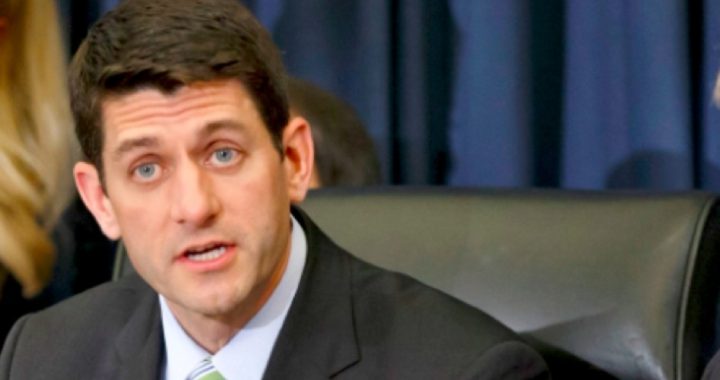
The Ryan budget is an annual event that is usually marked by a “conservative” call for 10 or more years of deficits and ever-increasing federal spending. April is the time of year when Republicans in Congress bravely state that — while they plan to continue deficit spending for the duration of their current term — they will order a Congress that will convene more than a decade into the future to balance its budget for the good of the nation.
But this year’s proposal by House Budget Committee Chairman Paul Ryan (R-Wis.) is special in that it features a couple of key claims in the press releases that are thoroughly refuted by the text of the budget itself.
The summary of Ryan’s “The Path to Prosperity” budget resolution for fiscal year 2015 boasts:
The House Republican budget cuts spending by $5.1 trillion over the next ten years. It targets wasteful Washington spending and reforms the drivers of the debt. This budget stops spending money we don’t have. A balanced budget will foster a healthier economy and help create jobs. This will ensure the next generation inherits a stronger, more prosperous America.
That sounds good. But anyone who takes the trouble to read just a few sentences more will find it isn’t even close to the truth. Assuming “cutting” is defined as reducing current spending levels, the Ryan Republicans admit that they won’t cut spending by a penny — but will, in fact, increase spending more quickly than the projected rate of economic growth. The Ryan budget “cuts” only future projected spending compared with the current budget auto-pilot proposed by President Obama. According to Ryan’s own budget proposal, his budget “increases spending at a more manageable rate” than under current policy. “For instance, on the current path, spending will rise by an annual average of 5.2 percent. Under this budget, it will rise by only 3.5 percent.”
Of course, the U.S. economy hasn’t seen sustained 3.5 percent GDP economic growth since the 1980s, when national debt was half its current levels and national savings was almost twice what it is today. So Ryan’s claim of sustainability would be subject to question, unless he envisions massive increases in tax revenues (which he does).
Ryan’s budget proposal also claims that the budget will be balanced 10 years down the road: “Washington cannot keep spending money it does not have. So this budget achieves balance in 2024 by bringing spending down below 19 percent of GDP by 2024.” But the statement is false. In 2024, outlays will still exceed revenues by $69 billion according to the numbers presented in the very same document. The summary tables in the Ryan budget call for some $4,995 billion in outlays and $4,926 billion in tax revenues in fiscal 2024.
Despite the lies, the Ryan plan does include some small reforms that cut entitlement spending in minor ways. Entitlement spending is the key problem for federal budgeting, as it has been put on auto-pilot, and increases in this category of spending (called “mandatory” spending) are automatically implemented. Because entitlement spending is an increasingly larger proportion of the federal budget, one could almost want to give Ryan a pass for his diminished expectations when viewed in the political context of a hostile Senate and White House controlled by the other political party.
But even on “discretionary” spending issues, where cuts should be easy to make, Ryan fails to show any political courage. His budget continues to lavish buckets of money that could be eliminated under discretionary spending bills that must be approved by Congress annually:
• Foreign Aid: The Ryan budget calls for $39.0 billion in outlays in fiscal year 2015 for foreign aid programs (of which about $13 billion includes State Department diplomatic funding), which Ryan terms “critical in advancing U.S. strategic priorities and interests” for such goals including “international development, food security, and humanitarian assistance.” The foreign aid levels represent a cut from Obama’s request and the current level, but this should be an easy line to zero out, as foreign aid is unconstitutional.
• Corporate Welfare: The Ryan budget pledges to “end corporate welfare,” but Ryan — who backed the TARP, automobile, and airline bailouts in congressional votes — calls for $27.8 billion in outlays for science-related projects in his budget. Even on energy subsidies, where Ryan lashed out with appropriately harsh criticism of the Obama administration’s energy crony corporatism, he says only that the federal government should “scale back corporate subsidies in the energy industry.”
• Military Spending: The United States’ military spending is higher than that of the next 10 nations combined, and almost as much as the rest of the world combined. But Ryan thinks we can’t cut any spending without making ourselves vulnerable to invasion: “This budget rejects the President’s additional cuts to national security,” Ryan explains. “This budget contemplates funding in excess of the President’s request, which could be used, in part, to maintain the 11 carrier strike groups called for under longstanding defense plans.” If the U.S. government can’t maintain military superiority by simply spending more than the next two or three largest military budgets worldwide, but has to continue to spend nearly as much as the rest of the world combined, Ryan’s patriotism may not be in doubt, but his ability to get value for his tax dollar should be.
• Education: Gone are the days of Republican leaders calling for the abolition of the Department of Education, as under President Reagan. The Ryan budget calls for the “maximum-award level for Pell” grants as well as a great deal more federal meddling in education.
One element of truth to the Ryan budget is its description of Obama’s budget: “And even with those extra tax hikes, the deficit will still be back above $1 trillion by 2022. The President’s budget never balances — ever. Instead, it allows our debt to spiral out of control.”
If only it weren’t also true of the Ryan budget.



